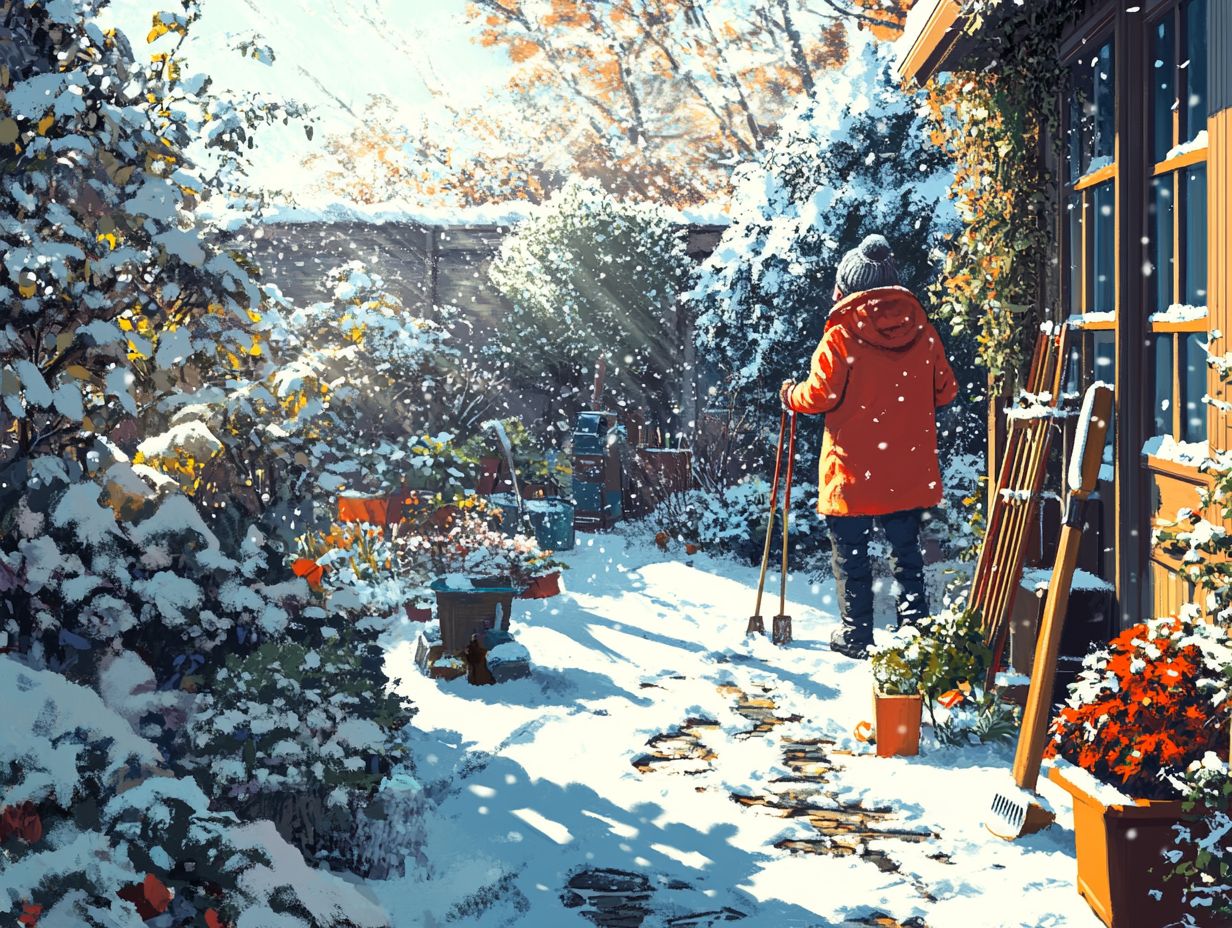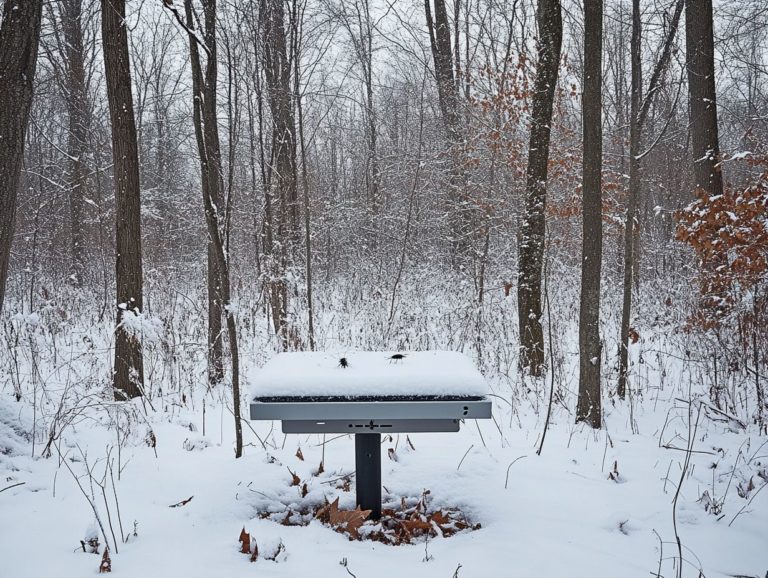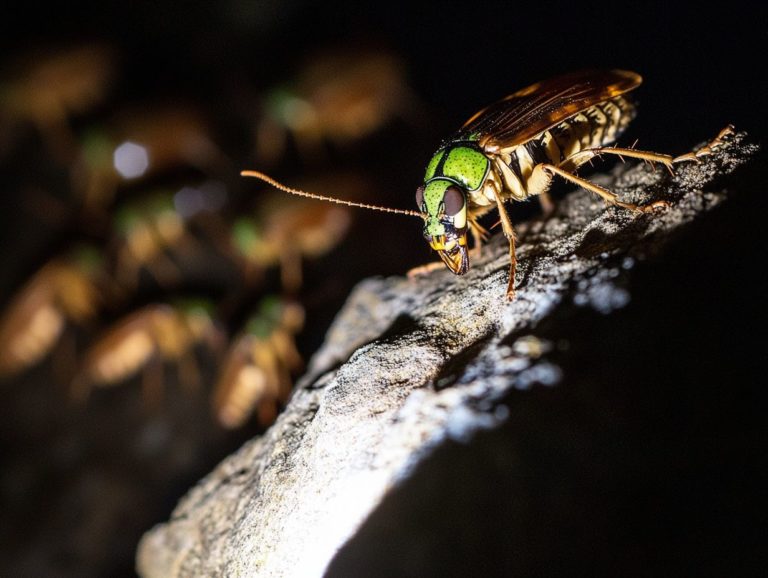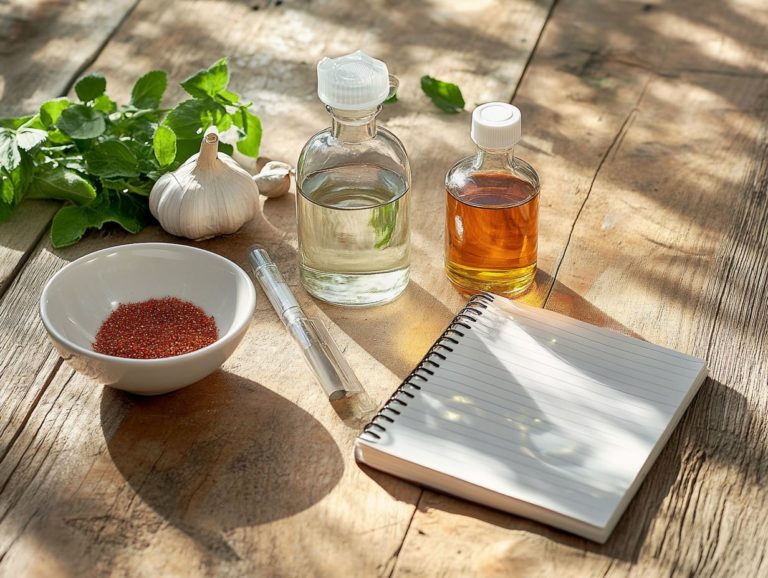5 Steps to a Pest-Free Winter Garden
As winter descends, your garden may transform into a haven for pests seeking to escape the chill. It’s time to take action on pest management to keep your plants thriving this season.
This guide delves into five essential steps for cultivating a pest-free winter garden. From tidying up your space to using natural control methods, you’ll uncover strategies for combating common winter pests.
You ll also find tips for protecting your plants sustainably and learn the signs of infestations to watch for.
Prepare to protect your garden while reveling in the serene beauty of winter!
Contents
- Key Takeaways:
- 1. Clean Up Your Garden
- 2. Remove Any Potential Hiding Places for Pests
- 3. Use Natural Pest Control Methods
- 4. Protect Your Plants with Covers or Barriers
- 5. Regularly Inspect and Monitor Your Garden
- What Are the Most Common Pests in Winter Gardens?
- Frequently Asked Questions
- What are the 5 steps to a pest-free winter garden?
- Why is it important to clear out debris in the winter?
- How can pruning help prevent pests in the winter?
- Are there any natural pest repellents that are safe for a winter garden?
- Why is it important to cover vulnerable plants in the winter?
- How often should I monitor my winter garden for pest activity?
Key Takeaways:

- Keep your garden clean and free of debris to prevent pests from making it their home.
- Eliminate any potential hiding places for pests, such as piles of leaves or wood, to discourage them from taking up residence.
- Use natural pest control methods, such as planting certain plants together and homemade sprays, to keep pests at bay without harming the environment.
1. Clean Up Your Garden
Cleaning up your garden is a crucial step in preparing for winter. This ensures that your outdoor space stays healthy and vibrant through diligent care and maintenance.
In regions like Texas, where the winter climate can be unpredictable, taking proactive measures is essential to protect your plants from potential frost and pests.
This process involves removing dead leaves, debris, and unwanted weeds. This creates a healthier environment for soil preparation and enhances the growth of indoor plants and winter crops when the seasons shift.
By clearing the area, you promote better air circulation and sunlight penetration, both vital for plant vitality. Once the area is clean, applying organic mulch works wonders in retaining moisture, regulating soil temperature, and suppressing weeds.
Preparing your soil in this way makes it more receptive to nutrients, setting the stage for effective pest control. A clean garden now means richer soil, a reduced risk of disease, and a head start on cultivating lush, thriving plants come spring.
2. Remove Any Potential Hiding Places for Pests
Removing potential hiding spots for pests is essential for maintaining a vibrant garden, especially during winter when these critters seek a cozy hideaway from the chill. Implementing strategies for protecting your garden from winter pests can further enhance your garden’s resilience.
Clear your garden of debris, piles of leaves, and excess mulch to significantly lower the risk of pest infestations.
Keep a close watch on garden structures like wooden trellises and raised beds, as pests often sneak into those nooks and crannies. Regularly inspect these areas and make necessary repairs; it can make a world of difference.
Utilizing organic pest control methods, such as those provided by Calloways, can also be effective. Techniques like planting certain plants together, using neem oil, or introducing beneficial insects not only safeguard your plants but also promote a thriving ecosystem.
Taking proactive measures in your garden care fosters a healthier environment, encouraging robust growth even during the colder months.
3. Use Natural Pest Control Methods
Employing natural pest control methods is an environmentally friendly way to protect your winter garden while ensuring your plants stay healthy, especially when considering ways to keep your cold garden thriving.
Using products like organic mulch from Calloways creates barriers that deter pests without harming beneficial insects or disrupting the surrounding ecosystem.
Consider incorporating beneficial insects like ladybugs or lacewings. These allies help manage pest populations by feasting on aphids and other troublesome pests.
Setting up traps, such as sticky tape or homemade fruit traps, minimizes unwanted visitors while keeping things safe for the environment.
Protecting your plants during winter can also involve covering them with frost cloth or burlap. These not only shield them from harsh weather but also prevent pesky intrusions.
By integrating these practices, you nurture your plants and contribute to a balanced ecosystem that thrives on harmony rather than chemical intervention.
Act now to protect your garden from pests this winter! Start today to ensure your garden thrives!
4. Protect Your Plants with Covers or Barriers

Implementing protective covers or barriers for your plants is essential for effective frost protection. This is particularly important for vulnerable species in your winter garden. Consider options like hoop houses or products such as DeWitt N-SULATE and NuVue. These can effectively shield your winter crops from harsh weather, ensuring they continue to thrive.
There are various protective measures available. Fabric row covers retain warmth and safeguard your plants from snow and ice. If you need something sturdier, consider using cold frames, which provide a protective structure for seedlings. Mulch is also a budget-friendly barrier that insulates the roots.
Choosing the right method is crucial. Tender greens and delicate flowers may require heavier insulation compared to hardier vegetables. By assessing your plants’ specific needs and understanding local climate patterns, you can ensure your gardening efforts yield vibrant results throughout the winter months.
5. Regularly Inspect and Monitor Your Garden
Regular inspection and monitoring of your garden are vital for the health and vitality of your plants, especially during winter when unexpected pest issues can arise. Keeping a keen eye on your garden allows you to identify problems quickly and address them before they escalate, ensuring a thriving winter garden.
Look for signs of pests like aphids or spider mites, which can damage dormant plants if left unchecked. Pay attention to any discoloration or wilting in leaves, as these are crucial indicators of plant health. Soil testing is equally important; it helps determine nutrient levels and the pH balance the level of acidity or alkalinity in the soil both essential for strong plant growth.
Regularly checking the soil moisture is also important. It helps prevent root rot and keeps your plants healthy. Being vigilant will help you cultivate a more resilient garden, ready to flourish as winter transitions into spring.
What Are the Most Common Pests in Winter Gardens?
Understanding the most common pests in your winter garden is essential for effective pest control and maintaining the health of your plants. In areas like Texas, certain pests thrive during the colder months. You’ll encounter familiar culprits such as aphids, spider mites, and mealybugs pests that can wreak havoc on your plants if not monitored closely. It s crucial to actively monitor your garden to catch pests before they cause trouble!
These pests love warm, humid greenhouse environments where temperatures mimic their ideal conditions. Take aphids, for instance; they reproduce rapidly, with females giving birth to live young instead of laying eggs. This leads to a swift population explosion. Spider mites, although tiny, are incredibly destructive and thrive in dry conditions, quickly spreading through air currents in enclosed spaces.
Mealybugs are easily recognized by their cotton-like appearance. They can sap the strength from your plants and are notoriously difficult to eliminate once settled. To implement effective pest control measures, it’s crucial to understand their life cycles and environmental preferences.
How Can You Identify and Control These Pests?
Identifying and managing pests in your winter garden demands both vigilance and a keen understanding of their unique characteristics and behaviors. For effective strategies, consider these 5 tips for starting a winter garden. This knowledge gives you the power to tackle infestations before they jeopardize your thriving plants.
Monitor your plants closely and use organic methods to strengthen your garden against pests. Make it a habit to regularly observe your plants, keeping an eye out for signs like discoloration, webbing, or visible insects. For those looking to protect their garden during colder months, following key steps for preparing your garden for winter is essential. Common winter pests such as aphids and spider mites often lurk on the undersides of leaves, so don’t overlook those hidden areas.
Familiarizing yourself with their behaviors aids in identification aphids tend to gather in clusters, while spider mites weave fine webs that hint at their presence. Employing organic strategies can make a substantial difference; consider introducing beneficial insects like ladybugs or utilizing neem oil to help curb pest populations effectively.
Regular sanitation and nurturing healthy soil conditions can make it hard for these pests to survive, allowing you to deal with insects in winter gardens in a sustainable manner.
What Are Some Natural Pest Control Methods That Can Be Used?

Utilizing natural pest control methods is a sustainable and effective way for you to manage pest issues in your winter garden. To ensure success, consider preparing your garden for winter by introducing beneficial insects, using soaps that kill pests, and planting pest-repelling herbs, enabling you to nurture healthy plants without resorting to harmful chemicals.
To implement these strategies effectively, start by introducing ladybugs and lacewings. These little helpers are renowned for their appetite for aphids and other common pests.
Regarding soaps that kill pests, they can be a game-changer in targeting soft-bodied insects without harming the beneficial ones. Just remember to apply the soap solution during the early morning or late afternoon to avoid the harsh glare of direct sunlight.
Don t overlook the power of herbs like basil and mint; they not only elevate the flavors of your winter dishes but also act as deterrents against pests such as whiteflies and spider mites. Imagine a garden where these natural allies help keep pests away!
By cultivating a balanced ecosystem in your winter garden, you’ll find it much easier to keep those unwanted visitors at bay. Implementing 5 techniques for winter pest management can help you enjoy the benefits of a thriving garden.
How Can You Protect Your Plants Without Harming the Environment?
Protecting your plants without compromising the environment is entirely within your reach through environmentally friendly practices that champion sustainability while helping your plants stay healthy in your winter garden. By utilizing organic mulch, planting different crops together, and employing natural deterrents, you can cultivate a balanced ecosystem that supports plant health.
Implementing these techniques not only aids in pest control but also enhances soil quality and encourages a diverse habitat for beneficial insects. For instance, when you plant flowers that attract pollinators, you help regulate pest populations while simultaneously boosting your garden s overall productivity.
Crafting homemade pest sprays from natural ingredients like garlic or neem oil allows you to deter unwanted pests while keeping harmful chemicals at bay. By prioritizing these strategies, you can create a thriving environment that harmonizes the intricate relationship between plants, pests, and the surrounding wildlife.
Start implementing these methods today for a healthier garden! You ll love how easy it is to create a resilient garden that flourishes year after year.
What Are Some Signs That Your Garden Is Being Infested by Pests?
Recognizing the signs of pest infestation in your garden is crucial for timely intervention and preserving the health of your plants, especially during winter when they re already under stress. Look out for wilting leaves, discolored foliage, sticky residues on plants, and any visible pests. These signs should trigger your immediate attention and prompt monitoring.
Pests like spider mites and aphids are notorious for causing chaos among your vulnerable plants during winter. Spider mites tend to leave behind tiny webs on the undersides of leaves, while aphids often appear as clusters on tender new growth, leading to curling and yellowing.
Make it a habit to scout your garden regularly every few days is ideal to catch any issues early on. Using sticky traps can help you keep an eye on flying pests. Additionally, examining foliage with a magnifying glass can uncover hidden culprits you might otherwise miss.
Maintaining the right moisture levels is also key, as many pests thrive in dry conditions. By addressing infestations swiftly with suitable organic controls, you can protect your plants’ vitality throughout the chilly months.
How Often Should You Inspect and Monitor Your Garden for Pests?
Regular inspections and monitoring of your winter garden should be a weekly ritual to effectively manage pest control and ensure the health of your plants. By checking weekly, you can quickly spot any new pest issues!
Integrating these inspections into a consistent schedule allows you to observe critical factors such as soil moisture levels, leaf coloration, and any signs of disease or infestation. During each visit, pay attention to new growth patterns and the overall condition of the soil and surrounding areas. This methodical approach not only helps you diagnose potential issues early but also deepens your connection with the garden s ecosystem.
Adopting these practices will improve pest control and enhance the overall flourishing of your garden throughout the season.
Frequently Asked Questions

What are the 5 steps to a pest-free winter garden?
The 5 steps to a thriving winter vegetable garden are: 1) Clear out all debris and dead plants, 2) Prune trees and shrubs, 3) Use natural pest repellents, 4) Cover vulnerable plants, and 5) Monitor and address any pest activity.
Why is it important to clear out debris in the winter?
Clearing out debris in the winter is important because it removes potential hiding spots for pests and prevents them from overwintering in your garden. It also helps improve air circulation and prevents diseases from spreading.
How can pruning help prevent pests in the winter?
Pruning trees and shrubs in the winter can remove dead or diseased branches that may attract pests. It also helps to open up the canopy, making it less attractive for pests to hide or feed on your plants.
Are there any natural pest repellents that are safe for a winter garden?
Yes, there are many natural pest repellents that are safe for a winter garden. Examples include garlic spray, neem oil, and diatomaceous earth, which can help deter pests without harming your plants or the environment. Diatomaceous earth is a natural powder made from fossilized algae that can control pests.
Why is it important to cover vulnerable plants in the winter?
Covering vulnerable plants in the winter can protect them from harsh weather conditions and prevent pests from accessing them. This is especially important for young or delicate plants that may not survive the winter otherwise.
How often should I monitor my winter garden for pest activity?
It is recommended to monitor your winter garden for pest activity at least once a week. This will help you catch any issues early on and address them before they become a bigger problem. Regular monitoring can also help you determine if your pest control methods are working effectively.






